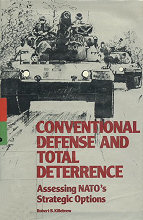
KILLEBREW : Conventional defense and total deterrence (fülszöveg)
In 1951 Dean Acheson called for the creation of "balanced collective forces in Western Europe that will continue to deter aggression after our atomic advantage has diminished." In the mid-1980s, after three decades of NATO's heavy reliance on nuclear deterrence, there is reawakened interest on both sides of the Atlantic in the conventional, or nonnuclear, component of Western deterrent strategy.
This book, written by US Army strategist LTC Robert Killebrew, makes a cogent argument for the importance and feasibility of an effective conventional defense in NATO's current strategy. As force modernization programs narrow the "risk window," Killebrew maintains that the defense community must begin devising more complete operational and strategic concepts aimed at defeating the Soviet doctrine of preemptive attack. He first examines the theater, forces, and operational styles of NATO and the Warsaw Pact in order to assess NATO's options were conflict to break out under an umbrella of continued nuclear deterrence. His conclusion is optimistic: with some changes in posture and a degree of risk, NATO is close today to having the capability to beat back a conventional WPO attack.
The second focus of this study is on the realignment of NATO's conventional defense strategy—particularly, how to shape strategy in the early stages of conflict to prepare better for successful counterthrusts in the longer term. In acting on nonnuclear warfighting requirements, Killebrew maintains, the West will frustrate Soviet conventional doctrine and shift responsibility for early nuclear use to the USSR. The result will be complete deterrence, a strategy that discourages aggression by NATO's enemies and builds confidence among its friends.